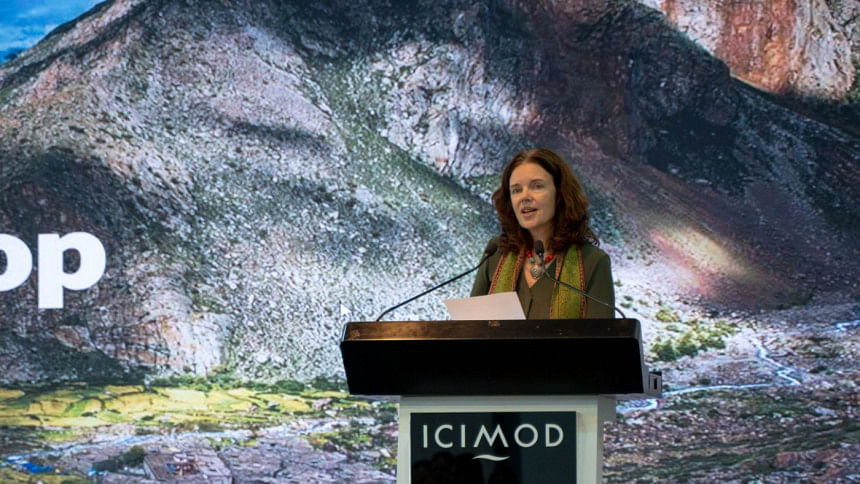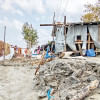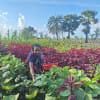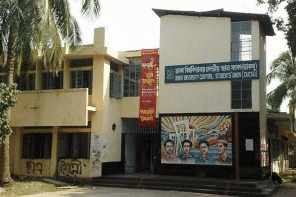'Bangladesh has emerged as a key learning hub for regional climate resilience'

Bangladesh has emerged as a key learning hub for regional climate resilience, said Izabella Koziell, deputy director general at regional organisation -- International Centre for Integrated Mountain Development (ICIMOD) -- headquartered in Nepal.
"Despite its high vulnerability to climate change, Bangladesh has established numerous good examples of community-led adaptation strategies that can serve as inspiration for those experiencing similar issues in the region," she said.
In an email interview marking the World Environment Day, Izabella Koziell shared with The Daily Star the challenges and potentials of Bangladesh in terms of mountain development, preserving the rivers and regional cooperation.
TDS: We, in Bangladesh, rarely hear the term "mountain development". Can you please explain it?
Koziell: Mountains are characterised by extreme terrain — and their remoteness and shifts in elevation have given rise to unique cultures and biodiversity. In a warming planet, with rapid demographic changes, these fragile environments and societies are under growing pressures — to conserve nature while supporting livelihoods and combatting poverty. We use the umbrella term "mountain development" for the innovation, testing, and scaling of the most appropriate methods and approaches to meet people's development aspirations and needs while protecting biodiversity and safeguarding investments in infrastructure, such as roads and hydropower.
TDS: Bangladesh has two hill regions – Chittagong Hill Tracts and Sylhet. What specific challenges do they face?
Koziell: The Chittagong Hill Tracts (CHT) and Sylhet are both vulnerable to climate change, although their issues are distinct due to their terrain and location. CHT is undergoing rapid change due to population pressures, agricultural expansion, and increased domestic tourism. Traditional cropping systems are being displaced by permanent agriculture, and unregulated tourism is endangering biodiversity-rich landscapes, rural villages, and fertile farmland. The unchecked development of hotels, businesses, and infrastructure poses a threat to lakes in CHT, forests landscape, and sensitive ecosystems. Springs and springheads an essential source of water for local communities, are also drying up. The region's unstable hillslopes are under increasing strain from environmental uncertainty, human activity, and climate change, unsustainable land use, and significant issues for populations that rely on these ecosystems.
Sylhet meanwhile faces increasing climate-related risks, including flash floods, waterlogging, and wetland degradation. Heavy rainfall and upstream river flow frequently submerge low-lying haor areas, damaging crops and fisheries. Unplanned urban growth and changing land use further strain its sensitive wetland ecosystems and rural livelihoods. The recent floods in Sylhet tell many stories about the impact of climate change.
TDS: Is ICIMOD doing anything in the CHT?
Koziell: We have undertaken a project — Green, Resilient, and Adaptive CHT Economy (GRACE) project that will use $10 million funding to help the most vulnerable hill communities in the Chittagong Hill Tracts (CHT) — and help it become more resilient to climate change. It will support the development of nature-based solutions and community-driven climate adaptation strategies following the direction of Bangladesh's National Adaptation Plan. The project aims to support establishment of more climate-resilient infrastructure, for example, improved retention ponds, restoration of springs and groundwater recharge systems in the water-scarce upazilas (sub-district units). Additionally, GRACE will improve the capacity of local governments, women, and youth to actively participate in climate-resilient development, disaster risk mitigation, and adaptation planning.
TDS: Bangladesh is a land of rivers but many of them are dying. What are your suggestions to prevent this trend?
Koziell: There must be urgent, stricter regulation, enforcement, and penalties for discharge and landfill. But what is also important is that steps are taken to maintain and sustain natural water flows upstream of Bangladesh – in the headwaters of Bangladesh's rivers. At higher altitudes, temperature rise is changing the pattern of snow and glacial melt that feed these rivers, it's also changing the intensity of rainfall, and groundwater recharge. These changes, as well as encroachment on river basins and other land use changes, are having a huge knock-on effect on downstream communities, with increasing risks from floods, land erosion, and salinity.
At ICIMOD we are promoting "integrated river basin management" (IRBM) approaches. We have also been calling for an urgent stepping up of scientific collaboration on rivers, and for the harnessing of local and Indigenous knowledge in water governance. We also strongly press for sustainable land use — which means curbing haphazard and unplanned development, as well as reducing deforestation, shifting cultivation, which will help reduce habitat loss and sedimentation of rivers. At a more macro level, no single country can tackle these alone. ICIMOD has, therefore, been facilitating processes that enhance regional collaboration among Hindu Kush Himalayan countries, as well as for presenting a unified voice in global forums.
TDS: How can ICIMOD help foster cooperation between nations as transboundary water management is critical for South Asia?
Koziell: ICIMOD, as a neutral convener, has engaged in significant efforts to foster transboundary water cooperation over its last 41 years by serving as a regional knowledge centre and as a science-policy bridge. Through our work on Resilient River Basins (RRB), ICIMOD promotes inclusive, climate-resilient approaches to water governance. By enabling structured collaboration and dialogue, the initiative helps countries shift from fragmented responses to shared strategies for addressing climate and water challenges in the Hindu Kush Himalayan transboundary basins. ICIMOD has helped facilitate the establishment of river basin networks that build trust and cooperation among riparian nations. ICIMOD also advances joint understanding through basin-scale assessments, vulnerability mapping, and integrated planning tools. By enabling data-driven decisions and fostering mutual learning, ICIMOD supports more cohesive and climate-resilient water governance across South Asia.
TDS: What role can Bangladesh play in regional climate resilience, particularly given its vulnerability and proactive adaptation strategies?
Koziell: As I said, Bangladesh has established numerous good examples of climate change adaptation. Early warning systems for floods and cyclones, together with a vast network of cyclone shelters, have saved countless lives and demonstrated that effective adaptation is feasible even with limited resources. Many nature-based solutions in Bangladesh are directly related to our National Adaptation Plan (NAP) intervention menu. Planting trees along key highways, such as the Dhaka-Chattogram Road, for example, helps mitigate climate impacts, protects infrastructure from intense heat, and increases biodiversity, while also improving air quality for Bangladesh and beyond.
The GRACE project's actions in mountainous regions, such as the CHT, will focus on restoring springs, safeguarding watersheds, promoting agroforestry, stabilising slopes, and introducing climate-resilient farming methods, all of which are based on Bangladesh's NAP adaptation guideline.
TDS: What would be your message to young Bangladeshi girls who aspire to be environmental leaders, scientists, or advocates?
Izabella Koziell: Women and girls there are often the hardest hit by the impacts of climate change. We need talented young women at the table. My message to aspiring Bangladeshi environmental leaders is – Remember that women everywhere are already "shaping a sustainable future" through conservation and innovation in the Hindu Kush-Himalayan Region. Pursue education and hands-on experience. Join networks (e.g. youth climate groups, science clubs, women's entrepreneur trainings) and learn from mentors. Every skill you gain multiplies your ability to protect the environment. By empowering women on the front lines, embracing gender-inclusive governance, and encouraging young female leaders, we create more just and effective environmental policies for all.

 For all latest news, follow The Daily Star's Google News channel.
For all latest news, follow The Daily Star's Google News channel. 








Comments